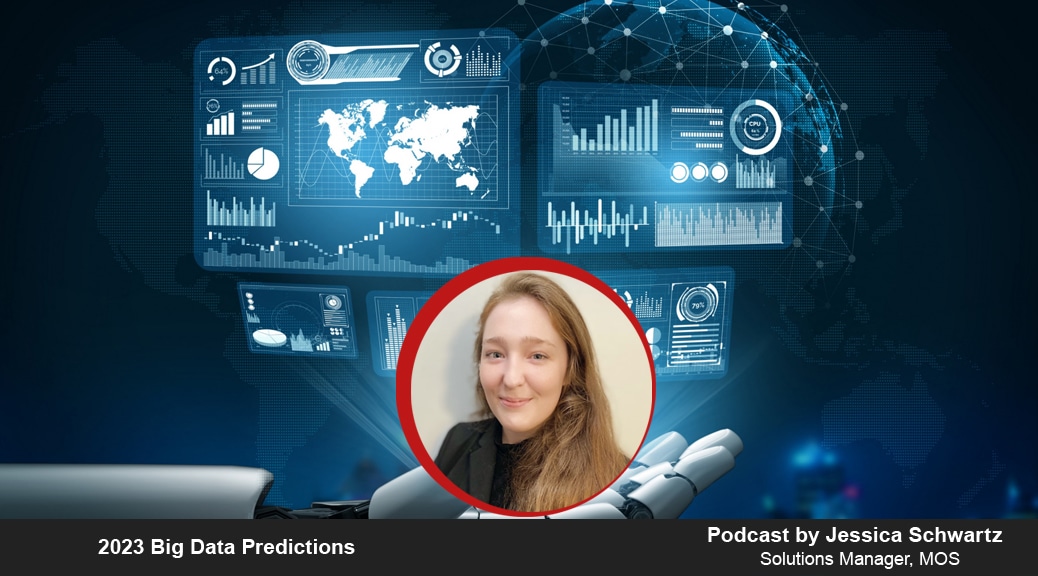At MOS, our team has vast expertise in providing data conversion solutions for a wide variety of business applications. They can support storing the data in a format that businesses require and thus make information access at any time.
In this podcast, Jessica Schwartz, Solutions Manager at Managed Outsource Solutions (MOS), discusses 10 big data predictions for 2023.
Podcast Highlights
0:28 Big Data Predictions
0:36 Machine Learning and Advanced Analytics
1:34 Edge Computing
2:11 Cloud and Hybrid Cloud Computing Adoption
2:42 Data Security
3:14 Data Governance and Management
3:54 Flexible Data Dashboards
4:15 Data Lakes
4:39 DataOps
5:17 Moving from Reactive to Proactive
6:00 Increased Focus on Data Quality
Read Transcript
Hello, my name is Jessica. I’m the Solutions Manager for Managed Outsource Solutions (MOS) and I’m here to talk to you about 10 big data predictions for 2023.
Capitalizing on big data using smart technology tools can drive clear decision-making. While relying on a data entry and data conversion service can ensure clean, curated information, turning big data into smart data is crucial to gain insights from it.
0:28 Big Data Predictions
Let’s take a look at 10 big data predictions for 2023:
0:36 Machine learning and advanced analytics: Increased adoption of machine learning applications is expected in 2023 and beyond. Machine learning automates the data analysis process and allows users to make data-driven predictions in real-time without any human intervention. Machine learning applications are used in finance, manufacturing, retail, genetics and healthcare, education, and many other industries. Zippia found that 76% of surveyed companies prioritized AI and machine learning over other IT initiatives in 2021. This proportion is expected to increase in the coming years. Predictive analysis is also on the rise. Predictive analytics help businesses understand customer reactions as well as potential reactions to a specific event, product, or service, and future trends.
1:34 Edge computing: Edge computing is the processing, analyzing, and storing of data closer to where it is generated to enable faster, high volume, near real-time analysis and response. Edge computing reduces the need for data to flow through networks and lowers computing and processing costs, especially cloud storage, bandwidth and processing expenses. IDC predicts that spending on edge computing hardware, software and services will reach $250.6 billion by 2024.
2:11 Cloud and hybrid cloud computing adoption: Cloud-computing adoption is increasing rapidly. With its benefits such as collaboration, data availability, flexibility, greater business agility and cost savings, more and more organizations are using cloud technologies and practices to process huge volumes of data. Hybrid cloud approaches are being developed to enable companies in regulated industries to take advantage of the cloud economies and technology benefits, notes TechTarget.
2:42 Data security: As organizations undergo digital transformation and use and share more sensitive data, they face increased data security risks. In 2022, tech giants like Apple, Meta, Twitter, and Samsung reported breaches of sensitive user data. As these threats continue to escalate, organizations are ramping up their data security infrastructure to better protect their sensitive information. The challenge is to effectively balance data security, privacy, and access.
3:14 Data governance and management: Insights derived from data analytics are driving business innovation. Every organization’s success depends on robust data management, more so when the goal of data management efforts is to support advanced analytics and AI and ML efforts. According to data analytics experts, data governance and management will find strong market footing in 2023. The spotlight will be on data governance as the need for privacy and security become more urgent. Companies will increase investment in data governance to keep data secure and up to standard.
3:54 Flexible data dashboards: With big data on the rise, data dashboards have become critical to pull data from various sources, track it and present it in a clean and easy-to-track way to a company as well as its clients. Today, technology allows teams to tailor their own dashboards to share information, monitor progress and trends, and improve workflows.
4:15 Data lakes: A data lake is a vast pool of both unstructured and structured data from multiple sources. This flexible centralized repository allows you to store all data of any size and scale. With almost all businesses using big data and AI to some extent, data lakes are becoming an increasingly common solution to manage huge quantity of data.
4:39 DataOps: DataOps processes and frameworks concentrate on organizational needs across the data lifecycle from generation to archiving. By providing data integration, data validation, metadata management, and observability, DataOps support effective data operations and reliable data processing. Reports indicate that more businesses will embrace the DataOps method to gather, process, and manage data through all channels and improve end-to-end data management.
5:17 Moving from reactive to proactive: Data teams must respond to the needs of other teams in the organization. But being overly reactive rather than responsive will lead to problems. Businesses will be shifting data strategies from reactive to proactive, according to www.adverity.com. This will involve building a shared understanding of data tasks, how long they take to complete, and how they will contribute to the strategic objectives of other team. A multi-pronged approach is required to shift a data team from working reactively to proactively and will look different to different individual teams and organizations.
6:00 Increased focus on data quality: More and more organizations are leveraging artificial intelligence (AI) to increase accuracy, boost productivity, improve workflow, enhance customer satisfaction and expand their operations. AI successes depends on data quality. Typos or incorrectly inputted data can result in incorrect code being assigned for AI processes, leading to inaccurate results and poor decisions that will impact customer services and more. The future of big data depends on optimizing data quality.
Big data has become a key component of the digital world. Almost all businesses and organizations have access to large data sets that they can leverage to create new processes and products. Having quality data is essential to take advantage of the above trends and improve efficiency and decision-making. Companies providing data capture and other outsourcing services can help businesses ensure accurate data for analytics, leverage information to understand the latest trends, and move forward with their business strategies in 2023 and beyond.
Thank you for listening. Please feel free to reach out at 1 800-670-2809!
Thank you. Have a good day!




